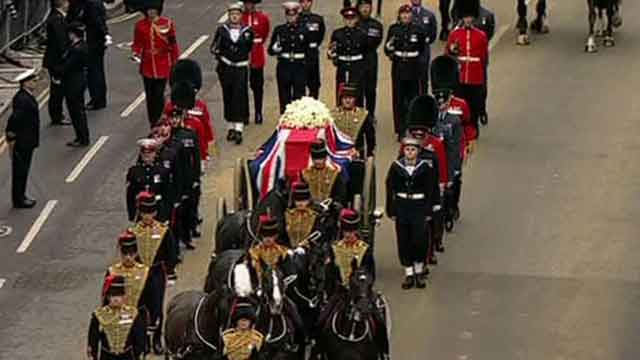LONDON – Britain's Iron Lady is being laid to rest with a level of pomp and protest reflecting her status as a commanding, polarizing political figure.
A coffin containing the body of former Prime Minister Margaret Thatcher was driven Wednesday from the Houses of Parliament to the church of St. Clement Danes for prayers ahead of the former leader's full funeral at St. Paul's Cathedral.
From there the coffin -- draped in a Union flag and topped with white roses and a note from her children reading "beloved mother" -- will be borne on a gun carriage drawn by six black horses to the cathedral, where 2,300 invited guests await.
Queen Elizabeth II and her husband Prince Philip will be among the mourners, who include dignitaries from around the world, 11 prime ministers, former U.S. Secretary of State Henry Kissinger and former U.S. Vice President Dick Cheney.
Dozens of people camped out overnight near the 17th-century cathedral in hopes of catching a glimpse of Thatcher's flag-draped coffin and its military escort, and hundreds had arrived hours before the funeral was due to start.
"I came to commemorate the greatest hero of our modern age," said 25-year-old Anthony Boutall, clutching a blue rose. "She took a nation on its knees and breathed new life into it."
Flags on government buildings were lowered to half-staff across the country ahead of the service, but not all Britons were joining in the mourning.
Hundreds of political opponents said they would stage a silent protest by turning their backs as the coffin went by.
"Like anyone else she deserves a decent funeral, but not at the expense of the taxpayer," said protester Patricia Welsh, 69.
More than 700 soldiers, sailors and air force personnel will line the route to the cathedral and around 4,000 police officers will be on duty as part of a major security operation, stepped up after Monday's bombings at the Boston Marathon that killed three people and wounded more than 170.
Parliament's Big Ben bell will be silenced for the funeral service, which will include hymns and passages from the Bible read by Prime Minister David Cameron and the late premier's granddaughter, Amanda Thatcher.
The woman nicknamed the Iron Lady transformed Britain during her 11-year tenure from 1979 to 1990, privatizing state industries, deregulating the economy, and causing upheaval whose impact is still felt.
She died on April 8 at age 87.
Thatcher is being given a ceremonial funeral with military honors -- not officially a state funeral, which requires a vote in Parliament. Still, the proceedings will feature the same level of pomp and honor afforded Princess Diana in 1997 and the Queen Mother Elizabeth in 2002.
That has raised the ire of some Britons, those who believe her legacy is a socially and economically divided nation.
Retired teacher Henry Page stood outside the cathedral Wednesday morning bearing a sign in protest at the funeral's reported $15 million cost -- "Over 10 million pounds of our money for a Tory funeral!"
Prime Minister David Cameron insisted the ceremony was "a fitting tribute to a great prime minister respected around the world."
The dean of St. Paul's, David Ison, has acknowledged the funeral has divided opinion, but said the service itself would be a somber affair.
"There is no tribute," he said. "There is no eulogy, and that was Mrs. Thatcher's decision. It's not being triumphalist. It's not a celebration of her life and her achievements."
Some high profile guests sent their regrets: Former First Lady Nancy Reagan -- whose husband Ronald had a close relationship with Thatcher -- will not be able to attend; nor will former Soviet leader Mikhail Gorbachev, who shared key moments in history with the late prime minister. Germany's Angela Merkel was sending her foreign minister, while the American political power families the Clintons and the Bushes declined to attend.
Alicia Castro, Argentina's ambassador to the U.K., also declined. Thatcher went to war in 1982 to retake the Falkland Islands after Argentina invaded the remote British territory off the South American coast.

